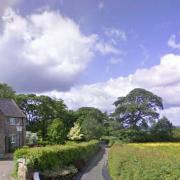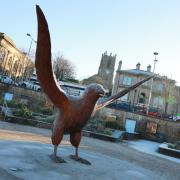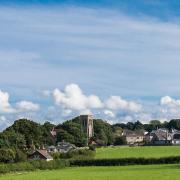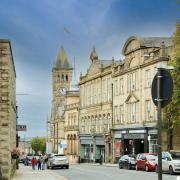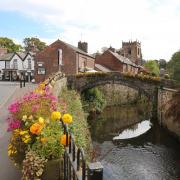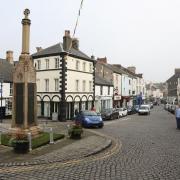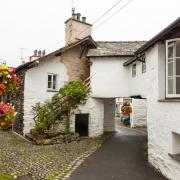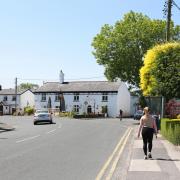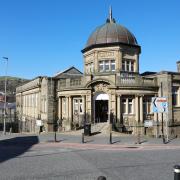The anniversary of the Pendle Witch trials and major changes to Lancaster's shopping centre mean this is a big year for Lancaster, as Paul Mackenzie reports Photography by Kirsty Thompson
Lancaster will be even more spellbinding this year as events are held to mark the 400th anniversary of the Pendle Witch trials at the castle. And if recent strange discoveries are anything to go by, there could be a few surprises in store.
Already ghost hunters have been reporting an increase in ghostly goings on around the city and the skeleton of a cat has been discovered bricked into the wall of a 17th century cottage where one of the witches is thought to have lived.
The castle – until recently a working prison – is likely to see extra interest in its tours this year and other events will be held across the city as Lancaster joins in the county-wide anniversary celebrations. A trail of specially commissioned art will stretch from Pendle Hill to Lancaster, the Judges’ Lodgings will host an exhibition of illustrations of witches from through the ukages and Sabbat, the play about the witch trials, will return to the Dukes Theatre.
But while one link with Lancaster’s past is being remembered, another is soon to be lost. The city’s market will close by the end of the year after councillors decided to surrender the lease which still has more than 80 years to run and costs in the region of �650,000 a year. Although the closure will cost taxpayers up to �20m – including compensation payments to stall holders – the council say it could mean long-term savings of around �40m.
Lancaster’s market charter dates from the 12th century and the council say they remain committed to providing a market in the city and that the outdoor market and Assembly Rooms Market are thriving.
But Peter Corke, who runs a cobbler’s stall on the market and is chairman of the Lancaster Tenants’ Association, said: ‘It’s a great shame that Lancaster is losing its indoor market. A good market is key to a decent city centre, it brings people in to the town.
‘Look at Bury Market – people go to Bury for the market and they don’t just spend money there, they go to shops around the town.
‘The report late last year by Mary Portas emphasised the importance of markets and said they are a vital ingredient of a town centre.’
He and other traders are now considering re-locating to other premises in the city but added: ‘If the compensation payments aren’t acceptable stall holder could stay put, we have leases up to 2015.’
Another long-standing feature of the city’s shopping scene, Chirnsides women’s clothes store on George Street, will close its doors next month after more than 140 years. But in spite of the high profile closures, Lancaster remains a popular choice with shoppers – all the big high street names are there, alongside a healthy number of small independent shops, packed into a relatively small city centre.
Most of the shops stand along pedestrianised streets, although there are also undercover arcades, and dotted around the city are a host of interesting attractions and a wealth of cafes, restaurants and pubs.
The city also has a thriving cultural scene, dominated by the ever-impressive Dukes Theatre, and a wide range of tourist attractions even without the witch trials anniversary. The landmark Ashton Memorial in Williamson Park is one of the city’s jewels – ‘the grandest monument in England’, according to Niklaus Pevsner – is a reminder of Lancaster’s importance a commercial centre.
The memorial was commissioned by Lord Ashton as a tribute to his late wife, although he had re-married by the time building work was finished. Ashton was born in Lancaster and made his millions producing oil cloth and linoleum which was exported from the city’s port all over the world.
Lord Ashton – born James Williamson – spent a lifetime in politics locally and nationally and, to prove some things never change, questions were asked in the newspapers when he was made a peer in 1895 with accusations (strongly denied) that he had bought the title.
And the city still has a healthy dose of political intrigue thanks to Ian Martin, a journalist and musician who got his big break aged 50 when he was invited to join The Thick of It as a ‘swearing consultant’. Ian is now one of the writers on the award-winning political satire and has just started work on the scripts for the new series which is due to be screened later this year.
‘My brother and I were working on a satirical website which featured some extremely nasty language so I was quite a good fit for The Thick Of It,’ Ian said. Series creator Armando Iannucci sent him the script ‘to do what I liked with it.’ He added: I changed one line to “He’s ****** useless. He’s as much ****** use as a ****** marzipan ******.” And that was the line that got me the job.
‘Since then I’ve wormed my way on to the writing team. They are such a talented team, I’m constantly thinking I’m about to be found out and they’ll realise I don’t deserve to be there.’
Ian has also produced a book, the Coalition Chronicles, which came out late last year and worked on an American political satire Veep, which will be broadcast in the States this year.
‘It’s very liberating writing such foul language. I love swearing on the page, it’s a joy but it certainly isn’t the way I speak. I do swear – who doesn’t? – but I abhor swearing in the street. It belongs in fiction and comedy.’
Where it is: Lancaster stands on the A6 near junction 34 of the M6. There are regular rail links with Preston, Kendal and further afield and if you have a sat nav, LA1 1XD should take you to the city centre.
Where to park: There are long and short stay pay and display car parks around the centre and a secure multi-storey near the castle which it is claimed was designed with women in mind.
Where to eat: You won’t go hungry in Lancaster – the city has a wealth of cafes, restaurants, delis, bars and pubs. For something a little different, try Quite Simply Food on Moor Lane, the Whale Tail Caf� on Penny Street or Atkinson’s on China Street which you can read about in Philippa James’ food pages.
What to do: There’s so much on offer. Visit the Grade One listed castle, the Ashton Memorial in Williamson Park and the city’s museums.



